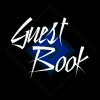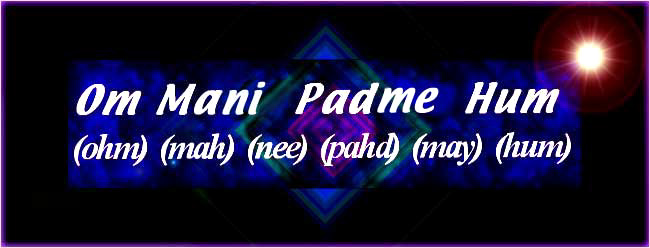

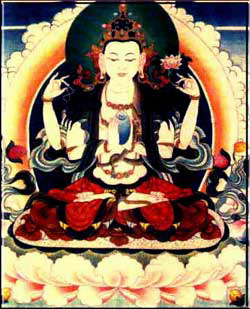

Chenrezig~Buddha of Compassion
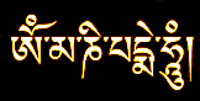
OM MANI PADME HUM is the mantra used most often by practitioners of Buddhism, invoking the wisdom and power of the Buddha of Compassion, Chenrezig (Avalokiteshvara) and is the mantra typically found in prayer wheels.
Within the prayer wheels are copies of the mantra,as many as possible, printed on very thin tisssue paper (or, in modern times, on microfilm), wound around a spindle and covered with a protective cylinder. The wheels may be turned by hand or by wind, water, or fire power.
His Holiness the Dalai Lama has said that having prayers such as OM MANE PADME HUM your computer works the same as a traditional prayer wheel. As the computer's hard disk spins thousands of times per hour, it sends out this peaceful prayer of Compassion to all directions and to all beings.

Commenting the meaning of the mantra, Gen Rinpoche said:
"The mantra Om Mani Padme Hum is easy to say yet quite powerful, because it contains the essence of the entire teaching. When you say the first syllable Om it is blessed to help you achieve perfection in the practice of generosity, Ma helps perfect the practice of pure ethics, and Ni helps achieve perfection in the practice of tolerance and patience. Pad, the fourth syllable, helps to achieve perfection of perseverance, Me helps achieve perfection in the practice of concentration, and the final sixth syllable Hum helps achieve perfection in the practice of wisdom.So in this way recitation of the mantra helps achieve perfection in the six practices from generosity to wisdom. The path of these six perfections is the path walked by all the Buddhas of the three times. What could then be more meaningful than to say the mantra and accomplish the six perfections?"
The six syllables also purify what Buddhists call the six realms of existence in suffering. Om purifies bliss/pride, Ma ~ jealousy/lust for entertainment, Ni ~ passion/desire, Pad ~ ignorance/prejudice, Me ~poverty/possessiveness, Hum ~ aggression/hatred.
This mantra originated in India and migrated to Tibet, where the pronunciation changed somewhat as the Tibetan people found some of the Sanskrit difficult to pronounce. The Tibetan form of the mantra is "Om mane peme hung". (There is a lovely story about the "right or wrong" way to pronounce the prayer at Darma Haven. It is called "The True Sound of Truth", and you can read it here
Buddhists believe that our true nature is of love and compassion, and by reciting this mantra we strip away the layers of ourselves that are covering up our true being. With each turn of the wheel, we send out our prayers to liberate all beings from suffering. With each turn of the wheel, we become more our loving authentic selves.
And now, while I'm off commuting to work, or doing the shopping, or whatever, I'll have my little mac here sending thousands and thousands of prayers out into the world. I can't think of a more beautiful use for technology.
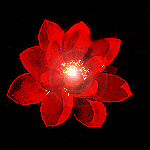
May all beings realize enlightenment.
Most of the images, and much of the information on this page was obtained from Darma Haven This is one of the best sites on Tibet I have found on the web and contains a vast array of information about the country and its people. If you would like to download a prayer wheel for your computer, I encourage you to obtain it from this site, as there are many more to choose from, and a more in-depth explanation of its use and importance.
Also, if you have never heard Deva Premal sing chants, I invite you to visit The official website of Deva Premal & Miten where you can listen to a few sound bites from her CD's. On her CD "Love Is Space", she sings this mantra and it is absolutely glorious. I encourage you to gift yourself with this CD, and any of her others.




